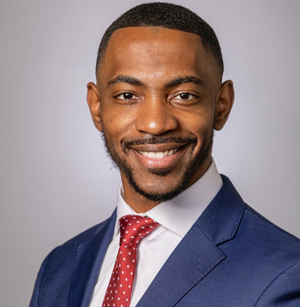by Tom Wilemon
Black In Cancer, an initiative cofounded by Henry Henderson III, PhD, a postdoctoral researcher at Vanderbilt-Ingram Cancer Center, is making an impact just two months after its inception.

“Black in Cancer Week,” held Oct. 11-17, focused on topics that ranged from addressing cancer disparities to debunking myths about cancer treatments. The event was so successful that it generated support from major sponsors and attention from Forbes media company. The goal of the organizers is to diversify the realm of cancer research, medicine and advocacy.
The initiative was spurred by false accusations against Christian Cooper, a Black birdwatcher, by a woman who claimed he had threatened her and tried to assault her in Central Park. Other African American birdwatchers began sharing their experiences on social media of being questioned or enduring negative comments about their presence in wilderness settings. Then similar discussions followed among Blacks in STEM (science, technology, engineering and mathematics) fields.
“That sparked a lot of movement on social media, particularly when it comes to Black people in the sciences,” Henderson said. “It started off with Black Birders Week. After that, it was other groups of African Americans highlighting themselves on social media, whether they were wildlife scientists, whether they were birders or whether they were whale watchers. We wanted to show that we were in these spaces.”
Henderson began exchanging Tweets with Sigourney Bell, a PhD student at the Cancer Research UK Institute at the University of Cambridge in the United Kingdom. Their social media engagement led to them founding Blacks in Cancer and recruiting others to help organize Blacks in Cancer Week. The event attracted major sponsorships, including Tigerlily Foundation, Fred Hutchinson Cancer Research Center and Cancer Research UK.
The topics of Black In Cancer Week, which can be accessed online for free, included “Promoting our presence” (#BlackInCancerRollCall), “Activating the reason” (#WhyBlackInCancer), “Proliferating the pipeline” (#TheCancerPipeline), “Evading the myths” (#CancerFacts), “Spreading the Word” (#CancerDisparities), “Avoiding self-destruction” (#BICSelfCare) and “Immortalizing our heroes” (#MyCancerHero).
“My favorite event was the roll call,” Henderson said. “We had the most Black people that I have seen in cancer careers in my life. It is absurd that it would be on social media. I’ve gone to these large conferences, but you don’t see that. We had people from Africa coming in. We had people from the United Kingdom coming in. We had people from Canada coming in. Just to see that our community was well represented was eye opening.”
Although subgroups for Blacks involved in cancer research and medicine exist within established professional organizations, Henderson said he is unaware of an independent society. The next steps for Black In Cancer are to establish a board of directors and become a 501(c)(3) nonprofit organization.
Other initiatives are on the horizon.
“Starting Jan. 1, we are launching two projects, a cancer disparity awareness project and a mentorship program,” Henderson said. “The cancer awareness project is going to have Zoom seminars and sessions. It will also be streamed live to Facebook about different cancers that disproportionately affect our community. We plan to focus on a specific cancer each month.”
Those cancers may include lung cancer, colorectal cancer, prostate cancer and triple-negative breast cancer, as well as the difficulty many Blacks experience finding suitable donor matches for stem cell transplants.
Henderson, whose interest in cancer research was spurred by a family history of the disease, noted that multiple studies have shown Black patients often fare better when treated by Black physicians.
“Research shows that if you have a Black physician you are more likely to take a clinical trial treatment or see other options as opposed to if you are treated by someone who doesn’t look like you,” he said. “We want to show that if we have more people in these work forces it trickles down from patient trust all the way down to health disparities. People who look like us are more connected culturally.”












